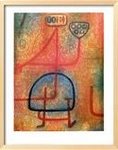Note: Obama has now officially pronounced his candidacy, and the Times has posted the text of Obama's campaign announcement. I'll let it speak for itself, save for noting the "humbling" early on, and the "battle" cries that make up the peroration, near the end. The guy's done his homework, and knows what he's doing on the stump.
Senator Biden’s characterization of rival Presidential candidate Barack Obama has received a thorough fourth-estate workout. I don’t have much to add to the current discussion – that is, on how Biden’s words code in contemporary American society – but thought I’d point out some connections in early modern culture, or to Shakespeare in particular, as they speak to enduring assumptions about race and rhetoric.
In a piece in Sunday’s Times on “The Racial Politics of Speaking Well,” Lynette Clemetson records the discomfiture blacks experience when they are praised for being “articulate.” Rounding up quotes from Anna Perez, Michael Eric Dyson, and D.L. Hughley, among others, Clemetson notes that “when whites use the word [“articulate”] in reference to blacks, it often carries a subtext of amazement, even bewilderment. It is similar to praising a female executive or politician by calling her ‘tough’ or ‘a rational decision-maker.’”
As Clemetson’s piece implies, the “amazement” springs from a racism that assumes that blacks are not capable, essentially speaking, of eloquence. The astonishment also stems, I think, from overlapping expectations about race, class, and education in America. That is, white eloquence satisfies expectations that whites are well-schooled, having been raised in the right school districts and availed themselves of opportunities for higher education. By contrast, despite a thriving black middle class, any black public figure perceived as eloquent is presumed to have overcome “poor” schooling. Having not been “left behind,” as expected, “articulate” blacks instead stand out, to unspeak (to use Steven Poole’s term) both racist assumptions and economic inequities.
As Clemetson also goes on to point out, “such distinctions discount as inarticulate historically black patterns of speech,” as a “black rhetorical tradition” developed independently of a “white” one. Clemetson quotes Tricia Rose, professor of Africana Studies at Brown, as noting, “Al Sharpton is incredibly articulate . . . But because he speaks with a cadence and style that is firmly rooted in black rhetorical tradition, you will rarely hear white people refer to him as articulate.”
Bill Clinton was known for his facility in the latter tradition, and for shifting register as the rhetorical occasion demanded – that is, for adapting his “cadence and style” to his audience. For some, this verbal dexterity marked Clinton as empathic, as his ability to speak to diverse audiences suggested the possibility that he could relate to their problems ("feel their pain"). For others, Clinton’s verbal dexterity marked him as politically opportunistic, if not craven (Slick Willie unleashing the gift of gab). Yet as Clinton’s rhetorical minstrelsy could be seen as another instance of whites coopting black modes of expression (cf., rock n roll), its politics went relatively unchallenged by critics left or right.
Shakespeare himself was famously damned with faint praise when fellow playwright Ben Jonson praised him in spite of his “small Latine and Lesse Greeke.” Compared to Jonson's abundant classicism, Shakespeare’s allusions to Cicero and Horace are relatively (and one might say, gratefully) few.
Shakespeare’s debts to the "white rhetorical tradition" he studied at his Stratford Grammar School are nonetheless evident in other forms of verbal dexterity. Students in humanist grammar schools would learn to write, and then orate, by imitating the style of their classical exemplars. In particular, students were taught to cultivate their own rhetorical style by putting the ancients’ ideas in their own words; the more copious – which is to say, the more faithful and prolific -- the imitation, the more distinctive the student. When we laud Shakespeare for his ability to “see all sides” of an issue, we are marking his skill in “varying the phrase,” his ability to articulate any given idea in other (indeed many other) words.
In fact, I (personally) believe Shakespeare has endured as an icon because we cannot pin him down, with exact certainty, to any one position. Where Ben Jonson is relentlessly didactic, to the point of closing off discussion, “ambiguity” in Shakespeare enables us to keep talking about him, and to continue to discover contrasting points of view. Harold Bloom has thus described, and lauded, Shakespeare as “bottomless.” For a U.S. Presidential candidate, however, it's known as “wishy-washy,” or “flip-flopping” (Slick Willie indeed).
As he frequently links oratorical prowess with battle strength, Shakespeare gives us much to talk about with regards to the politics of campaign rhetoric.
In Troilus and Cressida, Ulysses delivers his show-stopping speech “on degree” as the Greeks deliberate how best to thrash the Trojans. Scholars have debated to what extent Ulysses’s distinctly measured oration squares with his own covert calculations (it doesn’t), and the extent to which this speech on social order fits in this rhetorically and politically disjointed play (ditto). As with so many Shakespearean quotations, however -- that is, lines typically quoted out of context -- the speech is credited to Shakespeare as having articulated – articulately – some universal truth.
Moving on to the epyllion (or mini-epic) The Rape of Lucrece, Shakespeare equates rhetorical power more squarely with physical might. Prompted by Collatine’s loose-lipped boasts of his wife’s beauty, the tyrant Tarquin abandons the Roman war camp to wage a campaign on Lucrece’s virtue.
The conflict is expressly rhetorical. First, “set” to conquer Lucrece by Collatine’s speech, Tarquin “disputes” with himself whether and how he should proceed, and, twisting his own words to suit his ends, finds ways to interpret Lucrece’s chaste gestures as come-ons. Far from silent, Lucrece responds by imploring the tyrant to withdraw, to exercise discretion in both word and action. As she has no real voice in Roman society, however, her words carry no weight: rendered in few words, Tarquin’s physical overpowering of Lucrece is the tragic and perversely logical conclusion of his brutal manipulation of language.
In the end, Lucrece’s speechless, self-mutilated body becomes a Roman dumb show, indeed the bloody foundations for the Roman republic. That is, as the Tarquins and monarchy are banished in favor of Senators and consuls, an abuse of speech by a white male public figure precipitates the founding of a government based on the speech of white male public figures. Some tradition. We're still living it.
The Tragedy of Othello, however, presents the most germane analysis of race, education, and rhetoric. Like The Rape of Lucrece, the tragedy relates facility in speech to martial strength. When, in the play’s opening scenes, Othello is called upon to account for his seduction of Desdemona, Othello initially responds, “Rude am I in my speech,/And little blessed with the soft phrase of peace” – before he proceeds to describe, with great eloquence, how the Venetian maid was swayed by his tales of battle.
When Othello humbles himself before his Venetian prosecutors, he exercises rhetorical and political decorum. That is, were Othello not a Moor, his initial apology for his “speech” would read as a standard humilitas maneuver, as orators in the “white rhetorical tradition” conventionally humbled themselves before their audiences (stooping to conquer, as it were). Here, however, Othello’s “rude”-ness speaks to his race, and vice versa, as a gesture that places the speaker before his audience reminds the audience of Othello's alien status in Venice.
Demonstrating rhetorical facility that Shakespeare relates, as with Tarquin, to military might, Othello overcomes the challenge to his marriage, subduing those leaders who would sentence him for "stealing" Desdemona. When Othello concludes his speech, the Duke of Venice pronounces: “I think this tale would win my daughter too” (1.2.171).
"Amazement"? That's only the half of it.
For what is ethically straightforward in The Rape of Lucrece is abundantly complicated in The Tragedy of Othello. That is, there is nothing to commend Tarquin, as Shakespeare depicts his rhetorical abuse in ways that flesh out the king's storied perchant for violence (that is, as Shakespeare read him in his Livy). Othello, however, has been vital to the Venetians' rule of the Adriatic. Swayed, as Desdemona was, by Othello's considerable rhetorical brawn, the Duke elects not to punish Othello for his conquest, but to enlist him in the Venetians' war against the Turks. Othello may be a "savage," but he is the Venetians’ savage for hire. (In this respect, it is hard not to connect this play to Venetian hypocrisy in The Merchant of Venice: the Christians may condemn Shylock's practice of usury, but use him, they do.)
Othello is eventually undone by professional jealousy, as, envious of the Moor’s military advancement, and assuming Othello’s essential animalism, Iago conjures Othello's sexual jealousy by counterfeiting visual scenes of theatre (involving Desdemona’s handkerchief, for example), to render him “rude” and in-articulate: “O Desdemon! dead, Desdemon! dead!/O, O!" Iago is apprehended for his misdeeds, but readings of Iago as "evil incarnate" vastly oversimplify matters by discounting the ways the character has been scripted to carry out the culture's dirty work -- to reduce the Moor, ultimately, to silence.
As I spent a dozen years in Illinois, I have seen Barack Obama in person, and can speak to the inspiring effect he has on an audience. His promise extends beyond Illinois and the Beltway, however. A year ago, when I was weighing the move to Canada, I visited the Kingston area and met with various faculty and Ontario residents. Discussing the then-recent US elections, I was humbled by the Canadians' extensive knowledge of American politics. (It's always humbling to discover how better informed other citizens are of our nations' business; then again, those citizens have a considerable stake in the effects of our policies. It's so easy for us to forget that.) My dinner companions especially enthused about Obama and the hope he seemed to offer -- and this was a year ago, when he had only been elected Senator -- to the extent of voicing concerns about his safety. Humbled even more intensely by our nation's history (some might call it a tradition) of silencing its most inspiring figures, I observe the Obama campaign with the interest and concern of my (new) fellow country folk.
And hope that being called "articulate" is the worst he'll have to combat.
Tuesday, February 06, 2007
Campaign rhetoric
Subscribe to:
Posts (Atom)


